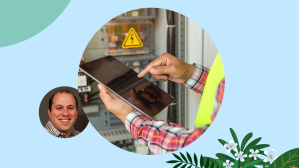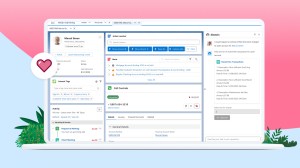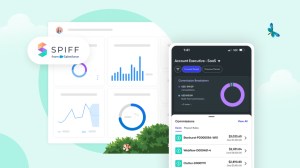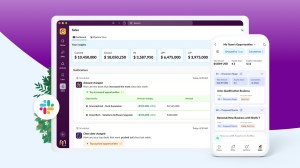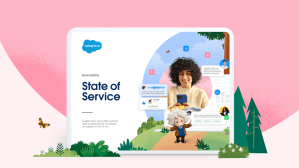The COVID-19 pandemic was a disruptive force in the world of field service, where technicians travel around to provide service to customers on site. More than ever, it is important to deliver field service safely — in a way that is scheduled, transparent and reliable. Today, companies across every industry are embracing both virtual and in-person scheduling to create safe and personalized experiences, creating a new “appointment economy.”
Eric Jacobson, Salesforce’s VP of Product Management for Field Service, sat down with us to share how Salesforce is helping companies thrive in the “new normal.”
Q. What does your role at Salesforce entail?
My job is to think about how we engage and empower a frontline mobile workforce — the people who deliver the last mile of experience for customers. We serve a wide range of industries, from utilities and telecommunications to retail and roadside assistance. The task is fairly complex, since you’re dealing with a remote workforce traveling to distant places and expecting them to be on time and prepared.
Q. How has field service management evolved over the past year in response to the COVID-19 pandemic?
In the beginning, the world was at a standstill because there was a lot of uncertainty. Yet we soon realized that work needed to continue. Field service came back not just quickly, but at scale, and companies had to reimagine how they’d continue to deliver service while keeping technicians and customers out of harm’s way.
That’s where the appointment economy comes in. Salesforce research shows that 77% of customers still prefer in-person service to alternatives, and nearly half have made appointments for people to visit their homes during the pandemic. To function safely, it has become more important than ever to deliver field service in a way that’s scheduled, transparent and reliable — instead of hoping someone shows up with the right parts during a four-hour window.
The pandemic has accelerated a trend toward more tailored experiences, and the appointment economy is part of that. But it goes beyond safety: Being more thoughtful about field service is an opportunity to plan more effectively, use resources more efficiently and deliver a higher quality of service.
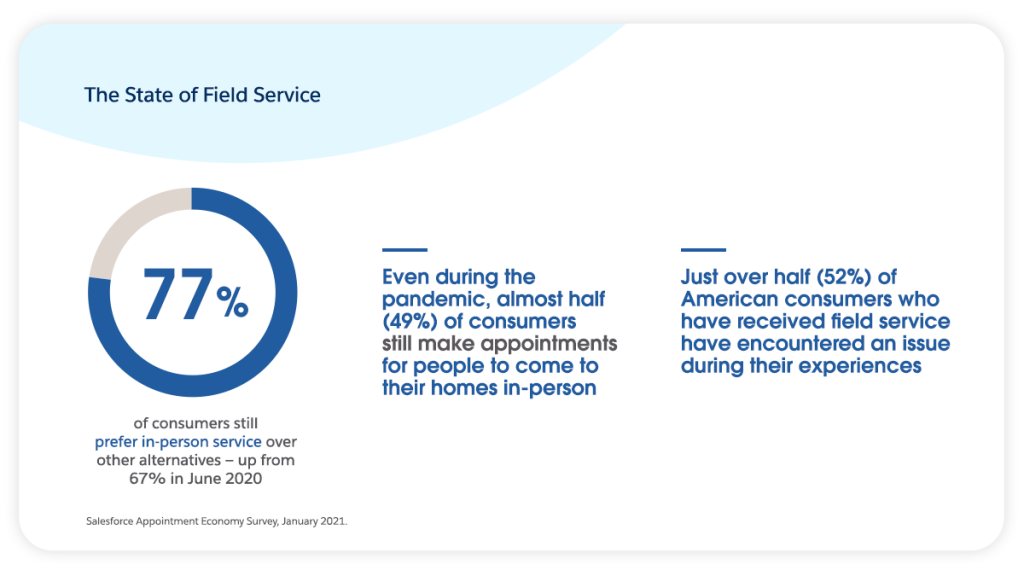
Q. Where do you see the appointment economy going after the pandemic (hopefully) recedes?
The pandemic served as a forcing function that required businesses to rapidly adapt and change. But even when we’re not wearing masks anymore, we won’t magically go back to the way things were. The way we expect service to be delivered has evolved, so upgrades to the experience — including the appointment economy — are here to stay.
Coming out the other side, companies will still need to figure out how to deploy the right people to the right jobs at the right time. Field service will continue to become more conscious and intentional, rather than reactive. Businesses will increasingly differentiate themselves through the personalized service that they deliver in the field. The key to doing this at scale is bringing in the right technology.
Q. How is Salesforce helping businesses succeed in the appointment economy when it comes to field service?
We’ve made a number of strategic changes to our product priorities to deliver the functionalities businesses need today. We recently launched Visual Remote Assistant, a tool that helps companies deliver service without coming on site by walking their customers through solutions remotely. It’s a win-win that allows customers to schedule remote visits at convenient times, minimizes risk for customers and technicians, and saves on costs.
Another addition is our new Appointment Assistant, which is generally available starting today. When you order meal delivery, you’re used to seeing exactly where the delivery person is and when they will arrive. We wanted to bring the same visibility and transparency to service in both B2B and B2C use cases, whether it’s having your washing machine or TV repaired, or fixing hospital equipment.
Q. How exactly does Appointment Assistant work?
Appointment Assistant helps customers easily track their service experience, from first contact to the moment a team member rings their doorbell. It provides real-time status updates about a technician’s arrival time on a customer’s preferred channel — whether email, text or WhatsApp. Receiving notifications helps customers get ready for the appointment, including taking steps to keep themselves and their families safe. For mobile workers, Appointment Assistant helps cut down on no-shows or waiting on unprepared customers, and it sets them up to deliver personalized service.
When building the product, we worked closely with our Office of Ethical and Human Use to ensure that we prioritized the privacy of mobile workers. For example, we encourage companies to get meaningful consent from employees, allow technicians to decide when to trigger location tracking and what personal information to share with customers, capture only necessary information and store data for the shortest time possible.
Q. What’s an example of a business you’ve seen successfully integrate appointments into their business model?
I’d point to our customer CarMax, which is the largest retailer of used cars in the country. The company was already in the midst of an ambitious digital transformation when the pandemic hit. With a strong digital foundation in place, they accelerated the rollout of a seamless, omnichannel experience that enables customers to buy a car online, in stores or through a combination of both. In a span of just three weeks, they launched CarMax Curbside, a capability that lets customers test-drive and buy a car in a contactless, socially distanced way. CarMax also completed the rollout of their home delivery option, now available to most customers.
Buyers can save time by completing most tasks on CarMax’s website, including picking a car, applying for financing and getting a trade-in offer on their current vehicle. The company turned to appointment scheduling through Salesforce Field Service to ensure associates are always prepared and can deliver a seamless customer service experience at customers’ homes. CarMax is a good example of a company that has responded to growing demand for convenience, personalization and safety in a way that enables them to deepen relationships with customers and stand out from the pack.
